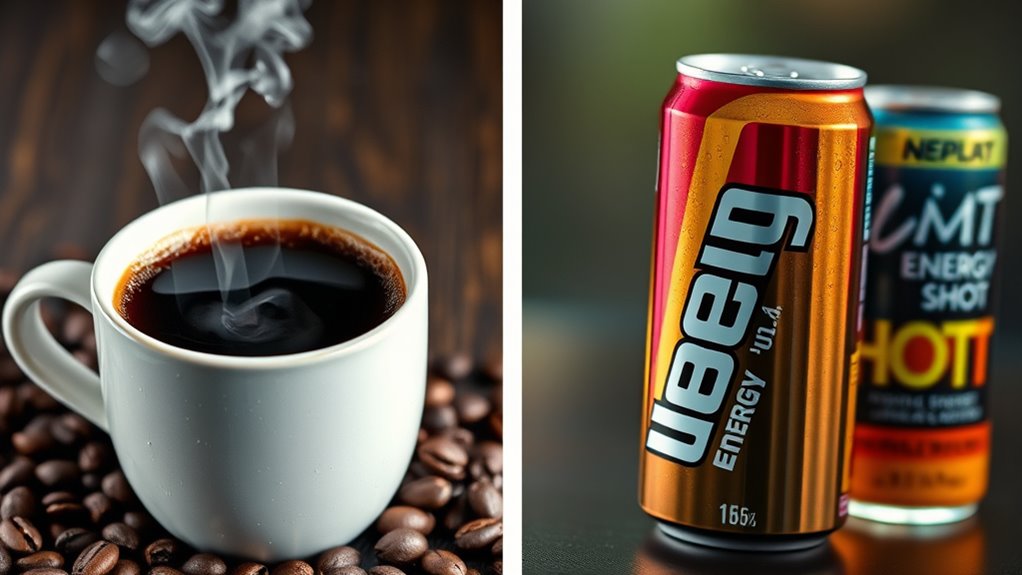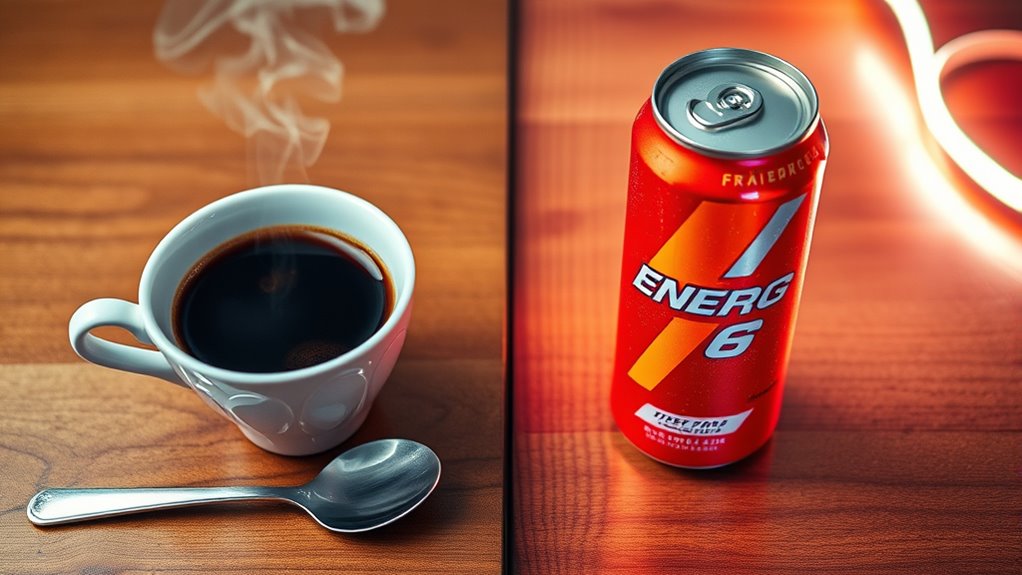If you’re aiming to boost productivity, coffee is your better choice for steady alertness and long-lasting focus, thanks to its natural antioxidants and customizable flavor. Energy drinks might give you a quick burst of energy, but often lead to crashes and health concerns due to high caffeine and sugar levels. Your taste preferences and health considerations matter, and understanding these differences can help you make a smarter pick—there’s more to uncover if you keep exploring.
Key Takeaways
- Coffee provides sustained alertness without sharp crashes, supporting longer focus sessions.
- Energy drinks offer quick energy boosts but often lead to subsequent fatigue and crashes.
- Regular coffee consumption is linked to health benefits like antioxidants, unlike energy drinks’ potential health risks.
- Coffee’s customizable flavors and warm appeal make it more versatile and personally satisfying for productivity.
- Excessive energy drink intake can cause cardiovascular issues, making coffee a safer, healthier choice for routine productivity.

Have you ever wondered which gives you a better boost: coffee or energy drinks? The answer isn’t straightforward, as both options come with distinct advantages and drawbacks. When it comes to health implications, your choice can substantially impact your well-being. Coffee, a natural beverage, is packed with antioxidants and has been linked to various health benefits, such as improved cognitive function and reduced risk of certain diseases. However, excessive consumption can lead to issues like insomnia, increased heart rate, or gastrointestinal discomfort. Energy drinks, on the other hand, often contain high levels of caffeine along with added sugars, artificial flavors, and other stimulants. While they can provide an immediate jolt of energy, frequent intake may raise concerns about long-term health risks, including elevated blood pressure, heart palpitations, or metabolic disturbances. If you’re health-conscious, you might prefer coffee for its more natural profile, but it’s still essential to watch your intake to avoid negative effects. Additionally, some energy drinks may contain added substances that could interact negatively with certain medications or health conditions.
Taste preferences also play an essential role in your decision. Coffee offers a rich, complex flavor profile that can be customized with cream, milk, or sweeteners. Its versatility allows you to enjoy it hot or cold, black or flavored, making it a favorite for many. Energy drinks, however, tend to have a more uniform taste—often sweet, tangy, or fizzy—designed to appeal to those seeking a quick, revitalizing boost. Some people find the taste of energy drinks too artificial or overpowering, while others enjoy the variety of brands and flavors available. Your personal taste preferences might sway you toward one or the other, especially if you find the flavor of coffee too bitter or the taste of energy drinks too intense.
Beyond taste and health, consider how each affects your productivity. Coffee’s caffeine content tends to produce a steady, sustained alertness without the rapid spikes and crashes associated with some energy drinks. This can help you stay focused longer, especially if you enjoy its aroma and warmth, which can add to the overall experience of your routine. Energy drinks might give you a quick burst of energy, but that can be followed by a crash, leaving you feeling more tired than before. If you’re looking for a reliable, healthier option that supports consistent productivity, coffee might be the better choice. Conversely, if you need an immediate pick-me-up during a long day or a workout, energy drinks can provide that quick jolt, albeit with some caution regarding health implications. Ultimately, your choice depends on your health, taste preferences, and how you want to fuel your productivity throughout the day.
Furthermore, understanding regulatory and safety standards can help you make more informed choices when selecting your beverage.
Frequently Asked Questions
How Do Long-Term Health Effects Differ Between Coffee and Energy Drinks?
Long-term health effects differ mainly in health risks and addiction potential. Coffee generally has lower health risks and less addiction potential because it contains less sugar and artificial ingredients. Energy drinks often contain high levels of caffeine, sugar, and additives, increasing your risk of heart issues, sleep problems, and dependence over time. You should consider these factors to make healthier choices, especially if you rely on these beverages regularly.
Which Beverage Provides a More Sustained Energy Boost Throughout the Day?
Think of yourself as a marathon runner, seeking steady energy. Coffee, with its slower caffeine metabolism, provides more sustained energy, reducing fluctuations. Energy drinks often cause quick spikes followed by crashes due to rapid caffeine absorption. So, if you’re after consistent alertness throughout the day, coffee’s your best bet. It helps keep energy stable, minimizing those frustrating energy fluctuations and giving you a dependable boost when you need it most.
Are There Specific Populations That Should Avoid Energy Drinks Entirely?
You should avoid energy drinks if you’re a teenager or pregnant woman. Teenagers are more vulnerable to the high caffeine and sugar levels, which can affect brain development and sleep. Pregnant women should steer clear because energy drinks may contain ingredients harmful to fetal health, like excessive caffeine and other stimulants. It’s safer to opt for healthier, natural energy sources to keep your health and well-being in check.
How Do Caffeine Absorption Rates Compare Between Coffee and Energy Drinks?
You might wonder how caffeine absorption efficiency differs between coffee and energy drinks. Coffee generally has a higher caffeine metabolization rate, meaning your body processes it more steadily. Energy drinks often contain other ingredients that can affect absorption, leading to quicker but sometimes less sustained effects. Overall, your absorption efficiency depends on the beverage’s formulation, which influences how fast and how much caffeine enters your bloodstream.
What Are the Environmental Impacts of Producing Coffee Versus Energy Drinks?
You might not realize it, but producing coffee often involves sustainable farming practices that help conserve water and protect ecosystems, though some farms still cause deforestation. Energy drinks, on the other hand, generate significant packaging waste due to single-use cans and bottles, which strain waste management systems. Both industries impact the environment, but choosing brands committed to sustainable farming and minimal packaging waste can make a difference.
Conclusion
In the battle of coffee versus energy drinks, think of coffee as the steady lighthouse guiding your ship safely through calm and stormy seas, while energy drinks are the lightning bolt igniting your engine in a burst of power. Both can boost your productivity, but choose wisely. Like a seasoned sailor, knowing when to rely on that gentle glow or that sudden spark guarantees you stay energized without losing your way. Your perfect fuel awaits.









